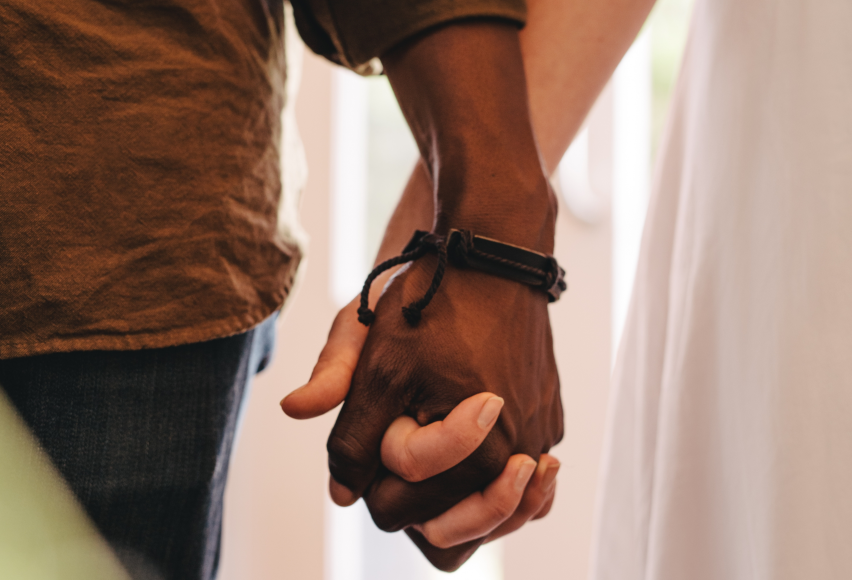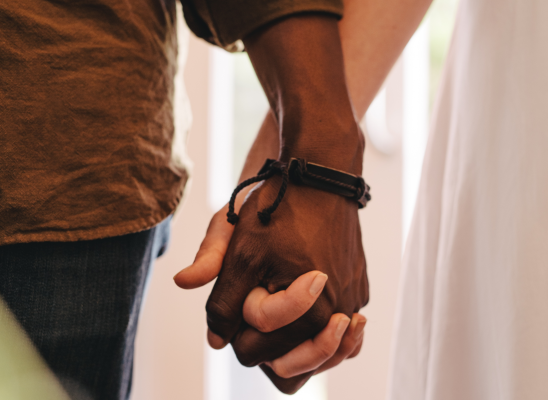
Online test
Find out the severity of your symptoms with this free online test
Let’s be real. Dating is nerve-wracking for most everyone. But, when you’re trying to date and living with Obsessive-Compulsive Disorder (OCD), it can present unique challenges.
OCD is more than just being overly neat or organized. It’s a serious mental health condition characterized by intrusive, unwanted thoughts (obsessions) and repetitive behaviors or mental rituals (compulsions) performed to alleviate distress. These symptoms can be quite debilitating and not surprisingly can significantly impact the dating process.
The good news is, while OCD presents challenges with dating and forming new relationships, you can successfully navigate the dating world. Some understanding and a few practical strategies can ease your fears and foster meaningful connections.
Understanding OCD in the Context of Dating
OCD affects approximately 1% to 3% of the population. That’s upwards of 70 million people. And, surely, many of them are trying to make love connections so you’re not alone.
OCD symptoms can manifest in various ways, such as fears of contamination, intrusive thoughts about harm, or a need for symmetry and order, even worries related to one’s relationships. In the context of dating, OCD symptoms can create barriers to forming and sustaining romantic relationships. Others may avoid dating altogether due to fears of judgment or rejection related to their condition. From the other person’s perspective, they may not fully understand OCD and struggle with how to connect with you.
The dating landscape, already rife with uncertainty and social pressure, can exacerbate OCD symptoms. The fear of vulnerability or being judged, the pressure to make a good impression, and worries about how the other person might feel can trigger obsessive thoughts and compulsive behaviors.
Key Challenges of Dating with OCD
Dating with OCD presents a unique set of challenges and concerns. Recognizing your challenges can help you to develop effective ways to manage them.
Fear of Disclosure
Probably the most significant worry when dating with OCD is deciding if and when to disclose your OCD to a potential partner. There’s the fear of being misunderstood, judged or stigmatized. Some may fear being rejected. Others may fear that they will be seen as somehow “broken” or unable to engage in a healthy relationship.
Experiencing Intrusive Thoughts During Dates
The obsessive thoughts that accompany OCD are not always predictable and can trigger at the least expected moments. Distressing thoughts happening during the date can make it hard to focus and be fully present with the person you’re with.
Worries About the Relationship
Relationship OCD is a form of OCD where a person’s obsessions and compulsions are focused on their relationships. They often have intrusive thoughts and doubts about their partner or the relationship. For example, someone with ROCD might experience intrusive thoughts about whether their partner truly loves them, leading to compulsive reassurance-seeking behaviors.
Social Anxiety and Perfectionism
There’s already a ton of social pressure that comes with dating, especially in the early days of a budding relationship. Of course, you want to make a good impression. That pressure can be heightened when you have OCD. You may feel pressure to appear “perfect” or worry excessively about saying or doing the wrong thing or having your OCD “revealed” before you’re ready to share. This focus on perfectionism can lead to avoidance of dating opportunities or overpreparation for dates to make it “just right”, which can be exhausting and even counterproductive.
Compulsions Interfering with Intimacy
Intimacy is a healthy part of a romantic relationship but OCD can interfere with intimacy. Compulsive behaviors, such as excessive checking, cleaning, or mental rituals, can interfere with spontaneity and intimacy. For example, if you struggle with contamination OCD, the idea of physical closeness might create distress or make it difficult to be close to your partner. This apprehension can be misconstrued as rejection.
Coping In Unfamiliar Settings
Dating often involves being in new places and situations like a loud, busy restaurant or an open space like a concert or park, or even a partner’s home. Being in unfamiliar settings may trigger your fears and symptoms, making it difficult to let your guard down, relax and enjoy being with your person.
Balancing Treatment and Dating
You might not immediately equate treatment with impacting dating. However, actively managing OCD requires a commitment of time and energy. Finding the time and emotional bandwidth to date can feel overwhelming, especially if your symptoms are not fully controlled yet.
So, you might be thinking, with all these challenges, how can I even date? The good news is that despite the challenges, many people living with OCD date successfully and find healthy, loving relationships. With some planning and a few practical strategies, you can have a great dating experience too!
Tips for Dating With OCD
A few practical strategies can help you to navigate the fears and challenges that can arise when dating with OCD. Here are some to try:
Practice Self-Compassion
Self-compassion is like treating yourself the way you’d treat your best friend. You’d be kind and compassionate and offer grace when needed. You are equally worthy of that kind of care. Research has found that practicing self-compassion can help mediate the feelings of uncertainty in people with OCD. Remind yourself that dating is challenging for everyone. Treat yourself with kindness and remember that your OCD does not define you. You are worthy of love and compassion. Journaling or practicing positive affirmations can help reinforce self-acceptance and challenge that negative self-talk.
Educate Yourself About OCD
Take time to learn about OCD. When you understand your specific OCD symptoms and triggers, you can better manage them in dating situations. You’ll also be able to educate others.
Communicate with Your Partner
Deciding when and how to disclose your OCD is one of the hardest steps to take. It’s important to remember that disclosure is a personal choice and it is yours alone to make.
As you’re deciding when or what to share, keep in mind that open and honest communication can foster trust and understanding in your partner. Not knowing why things unfold as they do can leave your partner confused.
When you feel ready, share your experience with OCD in a way that feels authentic to you. For example, you might say, “I have OCD, and it sometimes makes me anxious (or whatever your feelings are). I want you to know that I’m working on it. I’d appreciate your support.” Be prepared for questions. Your partner’s only experience with OCD might be what they’ve seen in the movies or on TV. Most partners will appreciate your honesty and be willing to learn. As the relationship progresses, consider involving your partner in your OCD management plan.
Also remember, almost everyone has something they are struggling with or are afraid to open up about. You sharing about your OCD might open up a door for your partner to open about something they are insecure about.
Be Realistic
Perfection is an illusion and can make dating feel like a never-ending game you can’t win. Instead of trying to create the “perfect” date, focus on being present and authentic in the moment with your date. Remind yourself that mistakes and awkward moments happen to everyone who has ever dated. Let yourself enjoy the experience and getting to know this new and interesting person.
Have A Dating Plan
OK, this tip might sound odd but having a dating plan can help you keep your anxiety in check. A plan can give you some control over things that might be unnecessarily stressful. For example, if really loud or strange places are uncomfortable, choose a quiet restaurant or café or even a picnic in the park for a date. Not only can choosing a quieter venue minimize sensory input that can trigger anxiety, but it also allows you to better engage with your date.
If you are afraid of intrusive thoughts coming up during the date, remember that these thoughts aren’t dangerous. They can make you feel uncomfortable, they can make you feel anxious, but they can’t stop you from living your life if you don’t let them. You can do everything even while experiencing those thoughts. The more you practice that, the easier it will get.
However, depending on the severity of your symptoms, you might consider a support strategy as part of your dating plan. You can think of this as a safety net, a plan to be able to either manage or move away from a situation if your symptoms become hard to cope with where you are. For example, try double dating with a trusted friend or have someone on speed dial who you can call if you find yourself getting overwhelmed. Sometimes a little reassurance is enough to help you get back to your date.
Practice Mindfulness
Having a few mindfulness strategies at the ready can help you stay present during dates and reduce obsessive thoughts. For example, if you find bothersome thoughts creeping in, take a moment and focus on your breath and gently steer your attention back to the conversation with your date.
Seek Support from a Therapist
Therapy is the cornerstone of OCD treatment. Exposure and Response Prevention (ERP) the gold-standard treatment for OCD, involves gradually facing fears without engaging in compulsive behaviors. A therapist can help you to identify your unique symptoms and how OCD affects your romantic life. Together you can find coping strategies tailored to work for you to manage symptoms, navigate relationships, reduce fears and boost confidence in your ability to successfully manage your OCD.
Putting It All Together
For those with OCD, the journey to love may take a little extra effort, but it is possible to have a healthy, loving relationship. When you have the right tools and a healthy perspective, you can overcome dating fears, embrace vulnerability, and date with confidence.
If you find yourself struggling with the dating scene, you’re not alone and there is help. Treatment for OCD isn’t just about treating symptoms. It’s also about learning how to navigate life’s experiences in healthy ways that work for you.
And, if you’re worried about making time to see a therapist, online therapy can be a viable, affordable alternative. Online therapy eliminates a lot of common barriers to therapy like location, scheduling, and geographic availability. And, online therapy has been proven to be as effective as in-office therapy for many mental health issues, including OCD.
StopOCD has a team of expert therapists ready to work with you to understand your unique situation and get you on the path to healing and wellness. If you’re ready to stop letting OCD interfere with your dating and relationships, StopOCD therapists are here to help.
References
1. Obsessive-compulsive disorder - StatPearls - NCBI bookshelf. (2023, May 29). National Center for Biotechnology Information. https://www.ncbi.nlm.nih.gov/books/NBK553162/
2. Doron, G., & Derby, D. (2014). Relationship OCD. International OCD Foundation. https://iocdf.org/expert-opinions/relationship-ocd/
3. https://www.reddit.com/r/OCD/comments/qp7zxy/dating_with_ocd/
4. Brawley, B., & Stier, M. (n.d.). Rules for Me but Not For Thee: Combating Rigid Perfectionism In An Imperfect Way. International OCD Foundation. https://iocdf.org/wp-content/uploads/2023/07/Rules-for-Me-but-not-for-Thee_Combating-Rigid-Perfectionism-in-an-Imperfect-way.pdf
5. Pozza, A., Veale, D., Marazziti, D., Delgadillo, J., Albert, U., Grassi, G., Prestia, D., & Dèttore, D. (2020). Sexual dysfunction and satisfaction in obsessive compulsive disorder: protocol for a systematic review and meta-analysis. Systematic reviews, 9(1), 8. https://pmc.ncbi.nlm.nih.gov/articles/PMC6953228/
6. Kaçar-Başaran, S., & Gökdağ, C. (2025). From self-compassion to obsessive-compulsive symptoms: The mediator role of intolerance of uncertainty. Current Psychology, 44(4), 2375-2384. https://link.springer.com/article/10.1007/s12144-025-07324-x
7. Hershfield, J. (n.d.). “Dear Loved One, I have OCD” - Tips for Individuals and Family Members about Disclosing Your OCD. International OCD Foundation. https://iocdf.org/expert-opinions/expert-opinionsdear-loved-one-i-have-ocd-tips-for-individuals-and-family-members-about-disclosing-your-ocd/
8. Feusner, J. D., Farrell, N. R., Kreyling, J., McGrath, P. B., Rhode, A., Faneuff, T., Lonsway, S., Mohideen, R., Jurich, J. E., Trusky, L., & Smith, S. M. (2022). Online Video Teletherapy Treatment of Obsessive-Compulsive Disorder Using Exposure and Response Prevention: Clinical Outcomes From a Retrospective Longitudinal Observational Study. Journal of medical Internet research, 24(5), e36431. https://pubmed.ncbi.nlm.nih.gov/35587365/
Online test
Find out the severity of your symptoms with this free online test
Start your journey with StopOCD
Take control of your life and find freedom from OCD through professional therapy and evidence-based cognitive behavioral techniques.
Start Now



